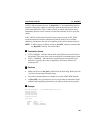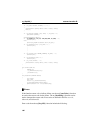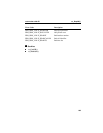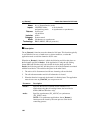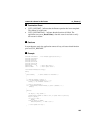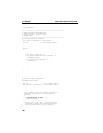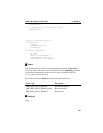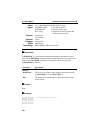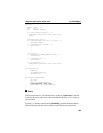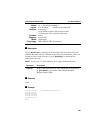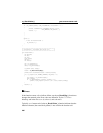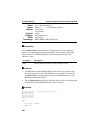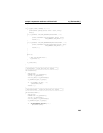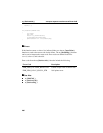
interprets the function return code cc_ResultMsg( )
199
void main()
{
LINEDEV devhdl = 0;
CRN crn = 0;
char *devname = “dtiB1T1”;
if ( cc_Open( &devhdl, devname,0)<0)
{
printf(“Error opening device: errno = %d\n”, errno);
exit(1);
}
printf(“Waiting for call\n”);
if ( cc_WaitCall(devhdl, &crn, NULL, -1, EV_SYNC)<0)
procdevfail(devhdl);
if ( cc_AnswerCall(crn, 0, EV_SYNC)<0)
callfail(crn);
.
.
.
.
.
/* Drop the call */
if ( cc_DropCall(crn, NORMAL_CLEARING, EV_SYNC)<0)
callfail(crn);
if ( cc_ReleaseCall(crn)<0)
callfail(crn);
if ( cc_Close(devhdl)<0)
printf(“Error closing device, errno = %d\n”, errno);
}
int callfail(CRN crn)
{
LINEDEV ld;
cc_CRN2LineDev(crn,&ld);
procdevfail(ld);
}
int procdevfail(LINEDEV handle)
{
int reason;
char *msg;
reason = cc_CauseValue(handle);
cc_ResultMsg(handle, reason, &msg);
printf(“reason = %x - %s\n”,reason,msg);
}
!
! !
!
Errors
If the function returns < 0 to indicate failure, use the cc_CauseValue( ) function
to retrieve the reason code. Error codes are defined in the files ccerr.h, isdnerr.h,
and isdncmd.h.
Typically, a < 0 return code for the cc_ResultMsg( ) function indicates that the
function reference (the line device number) is not valid for the function call.



